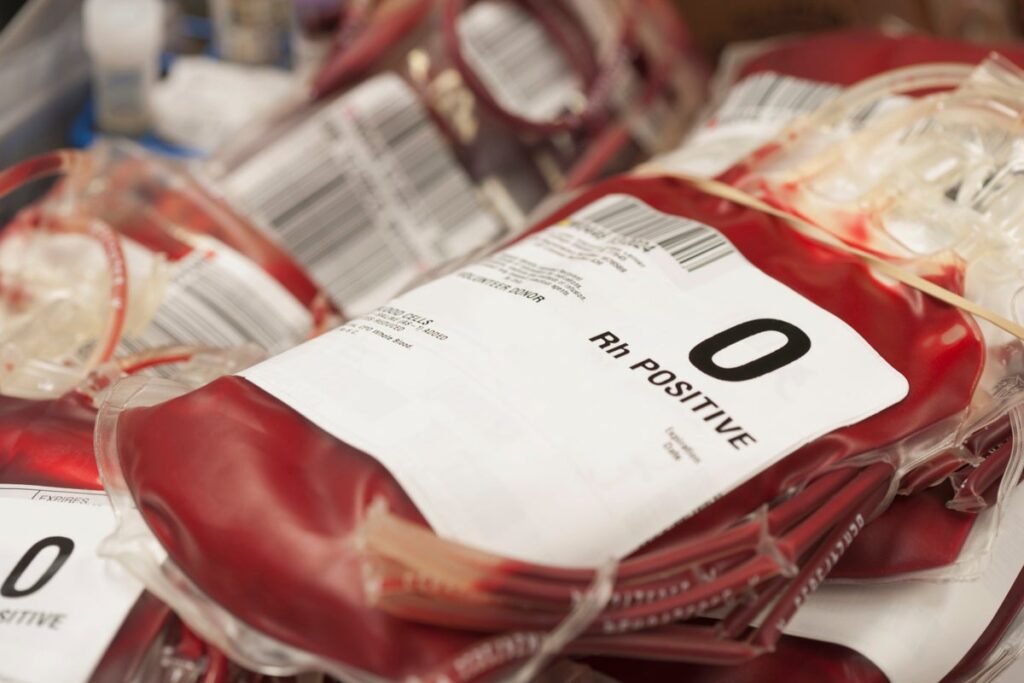October 7, 2025
2 min read
Scientists Perform First-of-Its-Kind Transplant Using Kidney with a Converted Blood Type
Recipient diagnosed with brain death received a type-O organ, which is compatible with all blood types
Pouches of donated blood in a hospital.
ER Productions Limited/Getty Images
Scientists have converted the blood type of a donor kidney and transplanted the organ into a person. The procedure — the first of its kind — could improve access to donor organs, specialists say, because the blood type of the donor would no longer matter.
Currently, organs from deceased donors can be transplanted into people only if they have a compatible blood type. This is because the recipient’s immune system can produce antibodies to attack and destroy the donated organ if the donor and recipient have different antigens, which come in two types: A and B. Organs that are blood type O do not have A or B antigens, so anyone can receive them.
Researchers from Canada and China used an enzyme to remove type-A antigens from a donor kidney. The enzyme converts type-A blood into type-O, says study author Stephen Withers, a chemist at the University of British Columbia in Vancouver, Canada. The type-O kidney was then transplanted into a 68-year-old brain-dead man in Chongqing, China. The organ remained healthy for two days before showing signs of rejection. It produced urine for six days. The results are published in Nature Biomedical Engineering today.
On supporting science journalism
If you’re enjoying this article, consider supporting our award-winning journalism by subscribing. By purchasing a subscription you are helping to ensure the future of impactful stories about the discoveries and ideas shaping our world today.
The enzyme was first identified in 2019 by some members of the same team. In 2022, they showed that a type-A lung could be converted into a type-O one, although the organ wasn’t transplanted into a person.
The results are groundbreaking, says Natasha Rogers, a transplant clinician at Westmead Hospital in Sydney, Australia. They could improve access to donor organs and reduce transplant wait lists. If the blood type of the organ was no longer a barrier for transplantation, physicians could focus on things such as matching other antigens unrelated to blood type, which are important in terms of how long a transplant will last, she adds
What’s next?
Living donors can give their organs to people with different blood types, but the recipient first has to undergo multiple treatments to lower their antibody levels, Rogers says. However, for deceased donors, there is not enough time for the recipient to undergo the treatments before the donor organ becomes unusable, she adds. The treatment also affects the recipient’s immune system, increasing the risk of infection.
Treating the donor organ instead of the recipient is a breakthrough, says Rogers. The study shows that a person could initially receive the same kind of immunosuppression given for transplants between people with matching blood types to reduce the risk of rejection. But more trials in brain-dead and trials in living people will be needed before the enzyme can be used routinely, she adds, including adjusting treatment for the organ or recipient to help the organ function for longer.
This article is reproduced with permission and was first published on October 3, 2025.
It’s Time to Stand Up for Science
If you enjoyed this article, I’d like to ask for your support. Scientific American has served as an advocate for science and industry for 180 years, and right now may be the most critical moment in that two-century history.
I’ve been a Scientific American subscriber since I was 12 years old, and it helped shape the way I look at the world. SciAm always educates and delights me, and inspires a sense of awe for our vast, beautiful universe. I hope it does that for you, too.
If you subscribe to Scientific American, you help ensure that our coverage is centered on meaningful research and discovery; that we have the resources to report on the decisions that threaten labs across the U.S.; and that we support both budding and working scientists at a time when the value of science itself too often goes unrecognized.
In return, you get essential news, captivating podcasts, brilliant infographics, can’t-miss newsletters, must-watch videos, challenging games, and the science world’s best writing and reporting. You can even gift someone a subscription.
There has never been a more important time for us to stand up and show why science matters. I hope you’ll support us in that mission.

